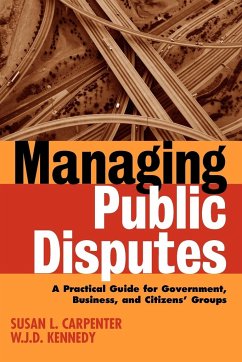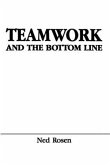Praise for Managing Public Disputes "This book has become a classic, offering sound advice about how to understand and use conflict resolution processes in the public policy arena." --Chris Carlson, codirector, Policy Consensus Initiative "A classic must-read for professional mediators, public officials, and involved citizens! Managing Public Disputes is a masterful blend of theory, practical application, and engaging stories that take the conflict resolver step-by-step through the dynamics of resolving public disputes." --Susanne Terry, mediator and faculty, Mediation Program, Woodbury College "Required reading for anyone wanting to turn stalemate into results. It is foundational for the practice and teaching of collaborative policy making." --Susan Sherry, executive director, California Center for Public Dispute Resolution, A Joint Program of California State University, Sacramento and McGeorge School of Law, University of the Pacific For more than a decade Managing Public Disputes has been the first choice, hands-on guide for managers, offering useful instructions for handling a wide range of large and small public controversies from the national to the community level and includes: * Ten proven principles for managing conflicts * A comprehensive framework with step-by-step procedures for creating productive outcomes * Seven illustrative case examples * Detailed advice on effective methods for collecting information, conducting interviews, and analyzing a conflict situation * Suggestions for handling special problems such as reluctant participants, keeping people at the negotiation table, and handling situations where emotions are running high * Eight tasks targeted for designing an overall strategy for managing public disputes
Hinweis: Dieser Artikel kann nur an eine deutsche Lieferadresse ausgeliefert werden.
Hinweis: Dieser Artikel kann nur an eine deutsche Lieferadresse ausgeliefert werden.
"This book has become a classic, offering sound advice about how tounderstand and use conflict resolution processes in the publicpolicy arena." (Chris Carlson, codirector, Policy ConsensusInitiative)
"A classic must-read for professional mediators, public officials,and involved citizens! Managing Public Disputes is a masterfulblend of theory, practical application, and engaging stories thattake the conflict resolver step-by-step through the dynamics ofresolving public disputes." (Susanne Terry, mediator and faculty,Mediation Program, Woodbury College)
"Required reading for anyone wanting to turn stalemate intoresults. It is foundational for the practice and teaching ofcollaborative policy making." (Susan Sherry, executive director,California Center for Public Dispute Resolution, A Joint Program ofCalifornia State University, Sacramento and McGeorge School of Law,University of the Pacific)
"The book is a truly excellent starting point for readers,mediators and facilitators..." (Mediate.com, 1/02)
"A classic must-read for professional mediators, public officials,and involved citizens! Managing Public Disputes is a masterfulblend of theory, practical application, and engaging stories thattake the conflict resolver step-by-step through the dynamics ofresolving public disputes." (Susanne Terry, mediator and faculty,Mediation Program, Woodbury College)
"Required reading for anyone wanting to turn stalemate intoresults. It is foundational for the practice and teaching ofcollaborative policy making." (Susan Sherry, executive director,California Center for Public Dispute Resolution, A Joint Program ofCalifornia State University, Sacramento and McGeorge School of Law,University of the Pacific)
"The book is a truly excellent starting point for readers,mediators and facilitators..." (Mediate.com, 1/02)







